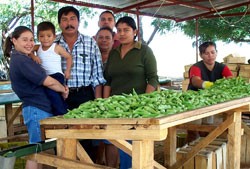
The members of the Araya family have been farming all their lives. On their 50-hectare farm they have planted a range of different crops — corn, sorghum and sesame. But these low-value products brought little return for the hard-working family. When USAID asked the Arayas if they would like to grow okra for export to the United States, they did not hesitate.
USAID is supporting a program to build Nicaraguan trade by helping thousands of producers like the Arayas diversify crops, improve quality and gain new markets.
Soon after planting, the Arayas’ fields were covered with okra plants, and the family set up its own processing and packing facilities to ship the okra to the United States. The family had another big break when USAID invited Sebastian Araya Jr. to participate in a trade fair in New Orleans. At the fair, Sebastian was able to establish a direct market link with a Miami-based vegetable wholesaler.
"With a free trade agreement, I'll have more options for buying production materials that could lower my costs, and I'll have a guarantee of a U.S. market for my okra,” said Sebastian Araya Sr. “I'm not worried about competition. I've received help from USAID to improve my production. I know I have a high quality product."







Comment
Make a general inquiry or suggest an improvement.